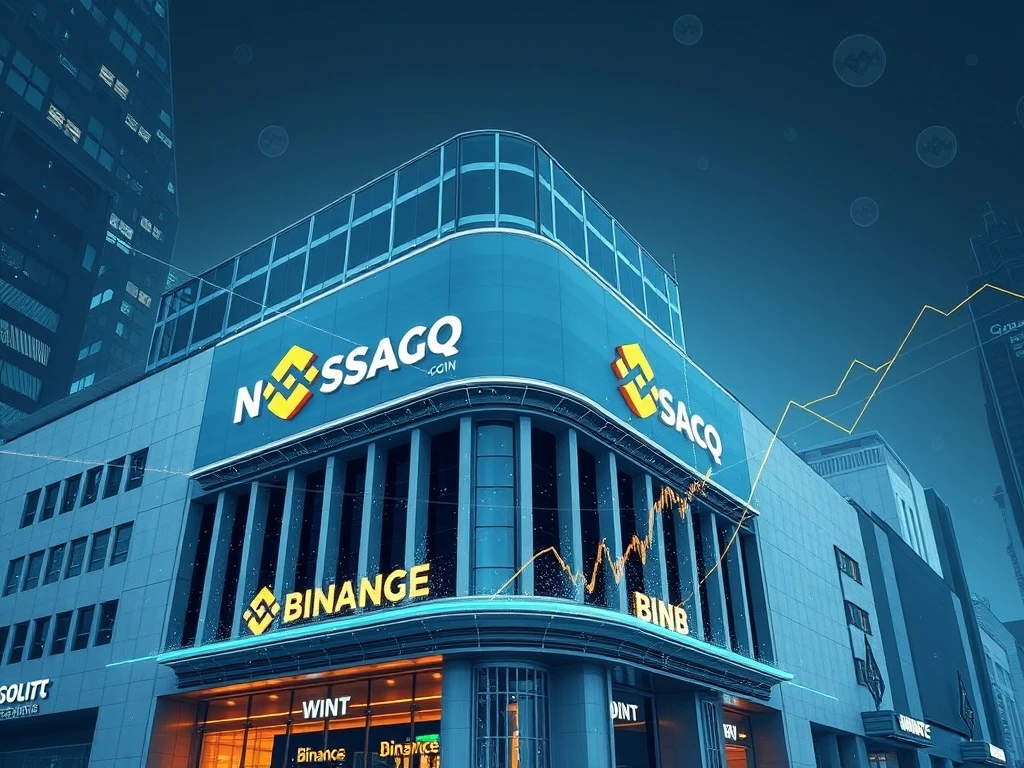Windtree Therapeutics Makes Historic $520M BNB Investment: A Game-Changer for Nasdaq Altcoin Exposure

In a groundbreaking move that could redefine the landscape of traditional finance, Windtree Therapeutics, a Nasdaq-listed biotechnology company, has announced a colossal $520 million investment into Binance Coin (BNB). This bold strategic decision positions Windtree as the first Nasdaq-listed firm to gain direct exposure to an altcoin, marking a significant milestone in the ongoing saga of institutional crypto adoption. For anyone following the evolution of digital assets, this isn’t just news; it’s a seismic shift, signaling a new era where corporate treasuries look beyond traditional assets and even Bitcoin, embracing the vast potential of the altcoin market.
Windtree Therapeutics: Pioneering Direct Altcoin Exposure
Windtree Therapeutics (WINT), known for its focus on developing treatments for acute cardiovascular and pulmonary diseases, is now making headlines in an entirely different sector. The company has initiated procedures to invest a substantial $520 million into Binance Coin (BNB), an allocation that will see a staggering 99% of these funds directed toward BNB acquisitions. This funding is sourced from a $500 million equity line of credit and an additional $20 million stock purchase agreement, demonstrating a significant commitment.
CEO Jed Latkin underscored the strategic importance of this move, indicating that, pending shareholder approval, future fundraising efforts could further amplify the company’s exposure to BNB. This proactive stance positions Windtree Therapeutics not merely as an adopter, but as a pioneer, breaking down barriers between traditional finance and the burgeoning altcoin ecosystem. This decision reflects a forward-looking treasury strategy, akin to traditional asset diversification but applied to digital assets, moving beyond speculative trading towards a more strategic, institutional perspective.
Unpacking the $520M BNB Investment: A Strategic Play
The decision to allocate such a significant sum, particularly 99% of it, to BNB is not arbitrary. It speaks volumes about Windtree’s confidence in BNB’s ecosystem and its long-term utility. BNB, with a market capitalization exceeding $105 billion, ranks among the top altcoins, standing alongside giants like Ethereum (ETH) and Solana (SOL).
Why BNB?
Windtree’s choice of BNB over other cryptocurrencies can be attributed to several key factors:
- Robust Ecosystem: BNB powers the Binance Smart Chain (BSC), a widely used blockchain infrastructure that supports a vast array of decentralized finance (DeFi) applications, NFTs, and Web3 projects. Its utility extends to transaction fees, staking, and participation in token sales on the Binance Launchpad.
- Established Credibility: Despite regulatory scrutiny faced by its parent company, Binance, BNB itself has demonstrated resilience and widespread adoption. Its established presence in the crypto market offers a level of stability and liquidity that newer, less proven altcoins cannot match.
- Strategic Partnerships: BNB’s existing partnerships and utility within the broader crypto space likely differentiated it from altcoins that rely solely on speculative hype. Windtree’s move could bolster BNB’s credibility further, enhancing its adoption in financial services and cross-chain transactions.
This approach contrasts sharply with the inherent risks associated with early-stage crypto projects or speculative ventures that tout scalability but lack proven adoption. By choosing an established altcoin, Windtree balances innovation with stability, a crucial consideration for risk-averse institutional investors.
The Rise of Institutional Crypto Adoption: Why Now?
Windtree’s bold step is not an isolated incident but rather a potent symptom of a broader, accelerating trend: the growing institutional crypto adoption. For years, major financial players viewed cryptocurrencies with skepticism, if not outright disdain. However, the narrative has dramatically shifted, driven by several factors:
- Inflationary Concerns: Traditional assets like fiat currencies have faced inflationary pressures, pushing institutions to seek alternative stores of value.
- Technological Innovation: The underlying blockchain technology offers unprecedented efficiency, transparency, and security, appealing to forward-thinking corporations.
- Maturing Market Infrastructure: The development of regulated crypto exchanges, custody solutions, and financial products (like Bitcoin ETFs) has made it safer and easier for institutions to enter the market.
- Pioneering Examples: Companies like MicroStrategy and Tesla initially led the charge with significant Bitcoin holdings, proving that corporate treasury diversification into digital assets was viable. While Nano Labs’ BNB treasury strategy remains underreported, its participation underscores the growing appeal of altcoins among diversified corporate portfolios.
The timing of Windtree’s announcement also coincides with growing institutional curiosity in crypto markets. Earlier rumors of a U.S. government-backed “Strategic Bitcoin Reserve,” while unconfirmed, highlighted evolving attitudes toward digital assets. Windtree’s move, however, focuses on a specific use case—corporate treasury diversification—rather than macroeconomic speculation. This pragmatic approach may resonate with investors seeking real-world applications over short-term price volatility.
Navigating Nasdaq Altcoin Exposure: Opportunities and Challenges
The prospect of Nasdaq altcoin exposure opens up a world of opportunities but also presents unique challenges that Windtree Therapeutics, and any future companies following suit, will need to navigate carefully.
Opportunities:
- Portfolio Diversification: Digital assets can offer uncorrelated returns compared to traditional stocks and bonds, potentially enhancing overall portfolio resilience.
- Access to Innovation: Investing in altcoins like BNB provides direct exposure to rapidly evolving blockchain infrastructure, decentralized finance (DeFi), and Web3 applications, allowing companies to participate in the future of technology.
- Potential for High Returns: While volatile, altcoins have historically offered significant growth potential, which could translate into substantial returns for early institutional adopters.
- Setting a Precedent: Windtree’s success could pave the way for other Nasdaq-listed companies to explore similar strategies, amplifying institutional demand for altcoins and legitimizing the asset class further.
Challenges:
- Regulatory Uncertainty: The U.S. has yet to finalize comprehensive crypto regulations. Institutions are increasingly testing boundaries, and Windtree’s shareholder approval process will be critical, as it sets a precedent for how traditional firms navigate regulatory scrutiny.
- Market Volatility: Altcoins, even established ones like BNB, are subject to significant price swings. This volatility can impact a company’s balance sheet and investor confidence.
- Shareholder Scrutiny: While the move signals confidence, shareholders will closely monitor the investment’s performance and the company’s ability to manage associated risks.
- Specific Altcoin Risks: Beyond general crypto risks, BNB has its own specific considerations, including its close ties to Binance and any potential regulatory actions against the exchange, as well as concerns about its degree of centralization.
Corporate Crypto Treasury: A New Paradigm for Balance Sheets?
Windtree’s strategy reflects a broader shift in Wall Street’s engagement with cryptocurrencies. By leveraging its corporate structure to access altcoin markets, the company signals confidence in BNB’s ecosystem. CEO Latkin’s comments about “future BNB purchases” suggest a forward-looking corporate crypto treasury strategy, akin to traditional asset diversification but applied to digital assets.
Implications for Traditional Finance:
- Normalization of Crypto Holdings: Such moves could normalize crypto holdings across traditional financial institutions, making digital assets a more common component of corporate balance sheets.
- Increased Institutional Demand: If Windtree’s strategy proves successful, it could incentivize other Nasdaq-listed companies to explore similar strategies, significantly increasing institutional demand for altcoins.
- Reshaping Market Dynamics: The influx of institutional capital could bring greater stability and liquidity to the altcoin market, potentially reshaping its dynamics and reducing reliance on retail speculation.
- New Investment Products: This trend could spur the development of new financial products tailored for corporate crypto treasury management, further bridging the gap between traditional finance and digital assets.
Critically, Windtree’s strategy avoids the pitfalls of overreliance on presale projects or unproven technologies. Unlike speculative ventures that lack proven adoption, BNB already supports a robust ecosystem. This reduces exposure to the inherent risks of early-stage crypto projects, a caution echoed by analysts in mid-2025 reports. By choosing an established altcoin, Windtree balances innovation with stability, a key consideration for risk-averse institutional investors.
What This Means for the Future of Finance
Windtree Therapeutics’ $520 million BNB investment is more than just a financial transaction; it’s a statement. It underscores the increasing legitimacy of altcoins as viable assets for corporate treasuries and marks a pivotal moment in the integration of digital assets into traditional finance. The outcome of its shareholder approval process and subsequent performance will likely influence the trajectory of institutional crypto adoption in the coming years.
This bold step could inspire a domino effect, leading other publicly traded companies to reconsider their treasury strategies and explore direct exposure to a broader range of digital assets. As regulatory frameworks slowly evolve, companies like Windtree are acting as trailblazers, demonstrating how innovation can push the boundaries of conventional investment, ultimately reshaping the future of global finance.
Frequently Asked Questions (FAQs)
Q1: What makes Windtree Therapeutics’ investment in BNB so significant?
A1: Windtree Therapeutics is the first Nasdaq-listed company to announce direct, substantial exposure to an altcoin (BNB). This move signals a significant shift in institutional crypto adoption beyond just Bitcoin, legitimizing altcoins as viable assets for corporate treasuries and potentially setting a precedent for other public companies.
Q2: Why did Windtree Therapeutics choose BNB over other cryptocurrencies?
A2: Windtree likely chose BNB due to its robust ecosystem, which powers the Binance Smart Chain (BSC) and supports numerous DeFi and Web3 applications. BNB also has an established market presence and utility, offering a balance of innovation and stability compared to more speculative or less proven altcoins.
Q3: What are the primary sources of funding for this $520 million investment?
A3: The $520 million investment is sourced primarily from a $500 million equity line of credit, supplemented by a $20 million stock purchase agreement. A significant 99% of these funds are allocated for BNB acquisitions.
Q4: What are the potential risks for Windtree Therapeutics with this investment?
A4: Key risks include the high volatility inherent in altcoin markets, ongoing regulatory uncertainty in the crypto space, potential scrutiny from shareholders, and specific risks related to BNB’s ecosystem and its ties to Binance, which has faced regulatory challenges.
Q5: How might this investment impact the broader crypto market?
A5: This investment could significantly bolster BNB’s credibility, potentially increasing its adoption in financial services and decentralized applications. More broadly, it could normalize crypto holdings among traditional financial institutions, amplifying institutional demand for altcoins and potentially leading to greater market stability and liquidity.
Q6: Will other Nasdaq-listed companies follow Windtree’s lead?
A6: If Windtree’s investment proves successful and its strategy navigates regulatory and market challenges effectively, it could certainly incentivize other Nasdaq-listed companies to explore similar corporate crypto treasury strategies, potentially sparking a new wave of institutional altcoin adoption.






